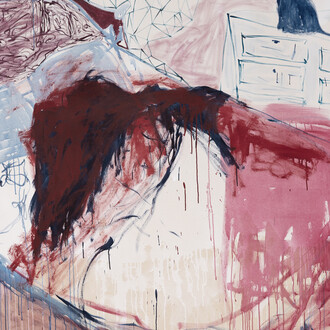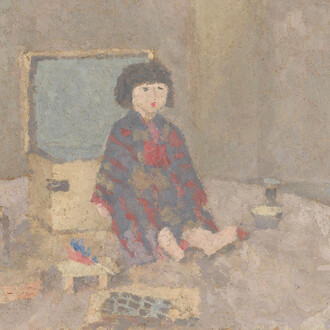Almine Rech Gallery, Grosvenor Hill is pleased to present π, e, ø, a solo exhibition by Ryoji Ikeda, organised with Olivier Renaud-Clement.
Japan’s leading electronic composer and visual artist Ryoji Ikeda focuses on the essential characteristics of sound itself and that of visuals as light by means of both mathematical precision and aesthetics. Ikeda has gained a reputation as a unique artist working across both visual and sonic media. He elaborately orchestrates sound, visual materials, physical phenomena and mathematical notions into immersive live performances and installations.
Ryoji Ikeda’s exhibition title π, e, ø stands for three important mathematical constants;
π (pi, the ratio of a circle’s circumference to its diameter) e (the base of the natural logarithm) ø (phi, golden ratio: a+b/a = a/b), all of which are infinite.
Infinity has perplexed many but also greatly inspired artists. Ikeda endeavours to reconcile the essence and idea of infinity through various practices and medium and to orchestrate these into a single symphonic materiality. Through the use of mathematical vocabulary, the artist seeks to present infinity in a visual way.
The works on paper, multiple variations of 1x1 surfaces of white and black from series of numbers, the transcendental and the irrational, are exhaustively visualised in decimal expressions reaching 1.25 million digits a piece. These signs are beyond the limits of human comprehension or experience, and must be taken for wonders — apparitions of ominous and numinous beauty. A restrained elegance and minimalism reigns throughout, but the monochromatic surfaces belie the furious richness and staggering detail within. Works from Ryoji Ikeda’s time and space series, which convert the notion of Time onto 2-dimensional surfaces (Space), are presented together with works from the test pattern series that refers to the mathematical constants π, e, ø and uses colors which are developed during the colour separation process of 16mm film. More silent epiphanies are present in related works that elegantly visualise silence and time. 0'10" shows the numerical countdown from 10 to 0 that precedes films, making physically manifest the immaterial and temporal notion of ten seconds of 16mm film. Similarly, the work 4'33', which consists of the physical equivalent of four minutes and thirty-three seconds of blank 16mm film with time code, clearly references John Cage's hugely philosophical meditation on the impossibility of silence.
data.scan [nº1-9] is part of Ryoji Ikeda's ongoing datamatics project (2006-) in which he explores the potential to perceive the invisible multi-substance of data which permeates our world. It is a series of experiments in various forms - audiovisual concerts, installations, publications and CD releases - that seek to materialise pure data. The audiovisual installations are composed of a combination of mathematics and the vast sea of data present in the world. Elaborately composed microscopic visualisations are shown on nine displays on plinths, all tightly synchronised with a minimal soundtrack and features sets of data from recent meta-scientific investigations mapping the human body and the astronomical universe (structures of errors, DNA sequence | chromosome nº11, morse code studies, molecular structure | protein, 4-dimensional hypercube | nodes). Positioned horizontally in intimate relation to the viewer's body, the installation offers an intimate perception of each singular data investigation.
Echoing data.scan installation, is an ambiguous archeology of encoded knowledge from the systematics series. Systematic patterns of data expression, from archival computer formats to contemporary technology referring to the technological progress of the digital age are displayed. These "primitive" systems, cultural artifacts and remnants of earlier technologies belong to a technological continuum beginning with the earliest stirrings of coded communication. The memory of a song forgotten in the piano roll, is now only silence, absence.
This initial and first exhibition at Almine Rech Gallery in London serves as an introduction and initiation into Ryoji Ikeda’s world. Recognised around the world as the leading artist in this field, the Gallery is pleased to propose its classic environment to reflect upon the various material and immaterial aspects of the work. This endeavour will be followed by exhibitions to be announced shortly in New York and Paris.
















